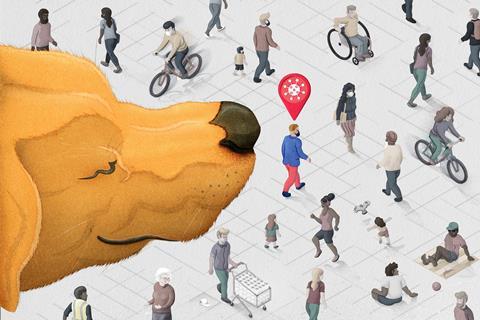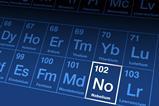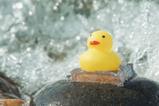Just how might dogs help in the fight against coronavirus?

In May, the UK government announced it was funding a clinical trial to see if dogs can be used as biosensors against the coronavirus. The idea is that specially-trained canines can sniff out asymptomatic or pre-symptomatic Covid-19 sufferers before they pass on the disease to others.
This is far from a barking mad suggestion. Dogs have an incredible sense of smell. Their noses house over 300 million scent receptors compared to a mere five million in humans. This means they can detect odours up to 100,000 times better than us.
Dogs can be trained to detect molecules at the equivalent dilution of one teaspoon of sugar in two Olympic-sized swimming pools of water. This super-sniffing skill explains why dogs are routinely used by law-enforcement agencies at airports to search for illegal drugs, explosives and forbidden foods. It is also why dogs have been trained to detect the scents associated with an increasing number of diseases over the past decade.
Many diseases cause small changes in the volatile organic compounds (VOCs) produced by the body. Dogs have now been trained to detect diseases such as cancer and malaria by sniffing out the relevant VOCs. To spot prostate cancer, for example, the dogs screen urine samples. And for malaria, they can sense the disease just by sniffing socks a person has worn overnight. Some canines are also now able to monitor the breath and body odour of people with diabetes for changes in blood sugar levels.
It isn’t known for sure whether harbouring the coronavirus changes the body’s VOC profile, but it has been shown that flu viruses and lung cancer both do. It’s a fair assumption, therefore, that the coronavirus will too.
Tails of working dogs
The new clinical trial is being run by researchers at the London School of Hygiene and Tropical Medicine in collaboration with Durham University and the charity Medical Detection Dogs.
First, the team will collect samples of breath and body odour from both Covid-19 patients and people who have tested negative for the virus. Face masks are one of the sources that have been suggested. Doggy trainers will then spend six to eight weeks training the dogs – Digby, Storm, Star, Norman, Jasper and Asher – to detect the differences between the two. At this point it will also be confirmed whether or not there are indeed any VOC differences between the two sample groups.
The dogs will be trained using a search-and-find game where they are given various samples that have been collected to sniff. Their trainers will give them a treat when they both correctly detect a sample from an infected patient and when they dismiss a sample from an uninfected person.
If this first trial proves successful, the team will start testing the dogs in real-life situations. The researchers estimate each dog could screen up to 250 people per hour. The eventual hope is that a team of doggy detectors will be deployed at all points of entry into the country, such as airports, to sniff out any potential coronavirus carriers before they come into the UK. This would support the government’s wider Covid-19 testing strategy.
Find out more
Use these articles to further explore the chemistry of smell with your students:
- A starter slide to introduce the idea of animals changing in smell when they’re sick.
- Have students read this article (which was orginally published in The Mole, the RSC’s magazine for students) to learn more about the chemistry of smell.
- Link the chemistry of smell and taste with students’ study of chromatography.
- Explore options for careers in chemistry with your leaners by watching this video of Tilly explaining how her role as an analytical chemist can help us to understand more about disease.














No comments yet